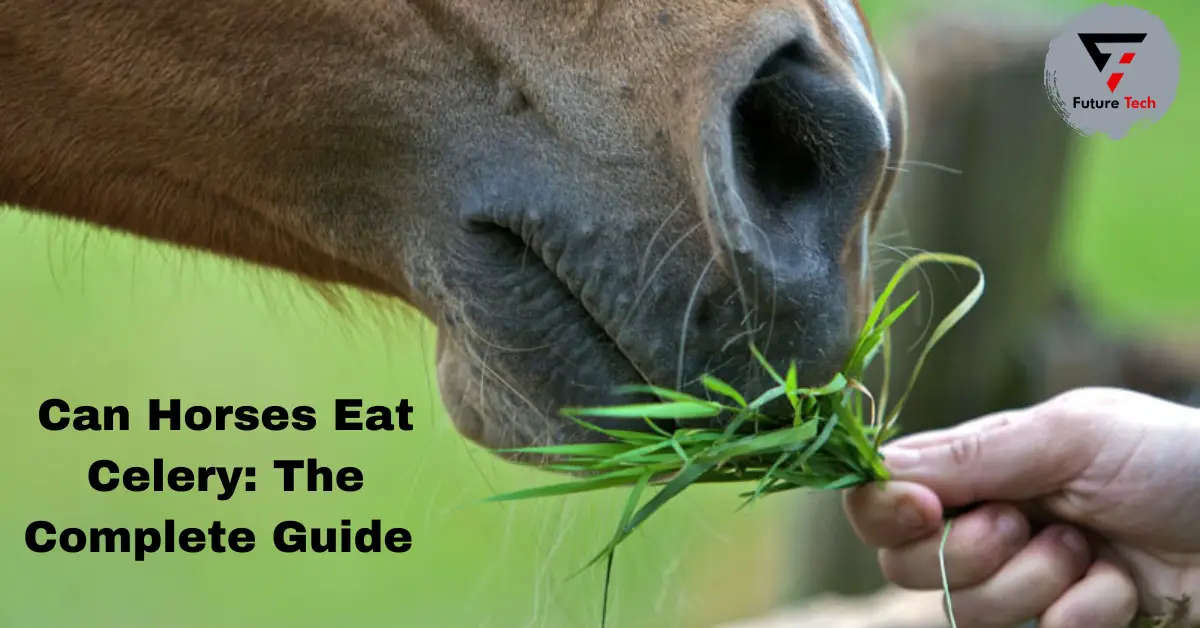Can Horses Eat Celery? When eaten in moderation, celery constitutes a healthful vegetable that could be included in a horse’s diet. There are several ways in which celery’s high water and fiber content suits horses’ health. Horses need to stay hydrated, and celery helps since horses shed a lot of fat during exercise. The fiber helps with digestion to maintain the horse’s digestive tract operating normally. Celery provides calcium, magnesium, essential vitamins and minerals like A, B, C, and K, moisture, and fiber. These nutrients help horses’ muscles, bones, immune systems, and eyesight. Antioxidants included in celery help the horse’s body rid itself of contaminants.
So, although people love the crunch of celery stalks, horses may get chopped-up treats made of nutrient-rich stalks and leaves. Twice or three times a week has become the ideal amount of celery stalks since too much might upset the stomach. When given sparingly to horses as part of a diet containing grains, hay, and other nutrients, celery is a tasty and nourishing supplement. Because of its nutrients and high moisture content, celery is a nutritious vegetable for horses.
Celery: What Does It?
Celery belongs to the Apiaceae family of vegetables, including carrots, parsnips, and parsley. It acts as a crisp, green vegetable. Fiber, antioxidants, vitamins A, K, and C, and other vital vitamins and minerals are abundant in this low-calorie snack. It also has phosphorus, magnesium, and water in it.
Is Celery Safe to Feed My Horse?
It’s true that you can and should give celery to your horse! Your pony may benefit significantly from celery’s many nutritional benefits. Because celery is low in sugar, it’s an excellent snack for older horses struggling with metabolic disorders like insulin resistance. Horses like the flavor and the firm, crisp texture. Celery may help a horse’s digestive system because of its high fiber content. Offering your horse celery may increase the fiber in their diet, even if hay and grass should account for the bulk of their diet.
Celery has vitamin A, which can help your horse’s skin glow and his vision become more apparent. Potent antioxidants in this vitamin may help fight off harmful cells known as “free radicals.” Celery contains phosphorous, good for your horse’s teeth and bones. Magnesium can improve neuron and muscle function.
Plus, celery has a lot of water, which helps to keep your horse hydrated.
Celery’s Nutritious Content
You may provide your horse with the following nutritional advantages by giving them an 80-gram serving of raw celery:
- 1.2 grams of fiber
- 0.4 grams of protein
- 0.7 grams of carbs
- 0.2 grams of fat
- 256 milligrams of potassium
- 32 milligrams of calcium
- 12.5 milligrams of P
- Vitamin A (17.6 mcg)
How to Give Celery to Your Horse Without Endangering Her Health
You ought to have become aware of the solutions to these crucial queries. Several methods exist to give celery to your horse without endangering its health, including how to cook celery specifically for your horse. I will walk you through a few safe ways to give celery to your horse.
Use fresh, organic celery only.
Make sure the celery seems fresh and organic when you purchase it. Old, moldy celery never appears to be a delicious treat, but most horses like the fiber crunch the vegetable provides. Aside from that, feeding it to horses remains unsafe. Ensure the celery hasn’t come into contact with pesticides or parasites.
I recommend that equestrians cultivate their Horses and Eat Celery. You may seem confident it will dissolve safely in this manner. Whether grown at home or purchased from a shop, always rinse the green vegetable under running water. Next, let it dry completely before giving your horses some fresh celery.
When giving your horse any veggies, including celery, thoroughly wash them in salted water for added safety.
Feed the leaves and stalks of celery to your horse, but first chop it.
Horses are not capable of throwing up. Eat may continue to pass through a horse’s digestive tract because of its unique digestive mechanism. The anatomy of the stomach prevents acid reflux. Because of this, a horse’s chance of choking on food increases more than ours when it eats. Horses consume the stalks as well as the leaves of celery. But it’s crucial to chop each celery stalk into little chunks before giving them to your horse. Similarly, only give your horse large bunches of celery leaves at a time. Chop them instead to facilitate swallowing and digestion.
Add celery to delectable horse treats.
A horse will usually accept a carrot or some crisp celery. However, sometimes your horse friend might be pickier and refuse to eat the green vegetable. Develop more creative ways to feed your horse nutritious veggies in these situations. Nearly all horses will eat peanut butter, I’ve discovered. When you give celery to horses, you may get even the pickiest ones to accept the dish by adding peanut butter.
Adding celery to the horse’s bran mash is another tactic for encouraging its consumption.
Can Horses Eat a Lot of Celery?
Horses are only safe to consume so much celery before suffering consequences. Recall that giving your horse excessive rewards, even celery, will not benefit them. Veterinarians and nutritionists advise against giving your horse too much celery. They recommend that a 500 kg horse consume no more than three kg of celery weekly. The next step is to divide this amount across two or three days at the very least. It’s reasonable to feed your 500 kg horse no more than 750g of celery thrice a week just to be cautious.
What Other Safe Substitutes For Celery Are Available For Horses?
Even if celery leaves and stalks feel out of season, you still want to provide your horse companion with celery’s health advantages. Most horse supply stores provide celery seeds as supplements. Horses’ digestive and urinary systems benefit significantly from their use. An added benefit for elderly horses is that it contains celery seeds. Eating celery seeds causes elderly horses with metabolic problems to warm up and expel poisons from their body. Their situation improves as a result.
Give your horse 20 grams of celery seeds daily in addition to their meal if they weigh 500 kg.
Summary
When given in moderation, celery constitutes a nutritious vegetable that may be included in a horse’s diet. Horses may keep hydrated, maintain a healthy digestive system, and get vital vitamins and minerals from it thanks to its high water and fiber content. In addition to hydration and fiber, horses need calcium, magnesium, and vitamins A, B, C, and K. Antioxidants found in celery aid in the body’s detoxification of the horse. The nutritional advantages of eat celery may extend to older horses that suffer from metabolic diseases such as insulin resistance.
Use fresh, organic celery, wash it well, and wash it in salted water if you want to. Horses Eat Celery to your horse without compromising its health. Because horses cannot throw up, chop the leaves and stalks of celery before giving them to your horse. Stir celery into peanut butter or bran mash, two delicious horse treats. A weekly maximum of three kilograms of celery, split over two or three days, should be fed to horses. Celery seeds are supplements at horse supply shops and may benefit horses’ urinary and digestive systems.
FAQs
Does celery stand in for other necessary foods for horses?
No, celery does not replace other necessary foods in a horse diet. Feed a horse balanced concentrates and premium horse feed in addition to celery. Make sure to include any vitamins that are required as well. Celery should not be fed as a main course; instead, it should be used as an additional source of hydration and some diversity in the diet.
Are there any hazards or issues while giving celery to horses?
For the most part, celery is harmless for horses. However, some may be allergic or sensitive to it. After feeding celery, you’ll be able to see whether there are any adverse effects. It’s simple to identify allergic responses or stomach problems. Should you recognize them, cease providing celery to your equine companion and contact your doctor to examine them.




